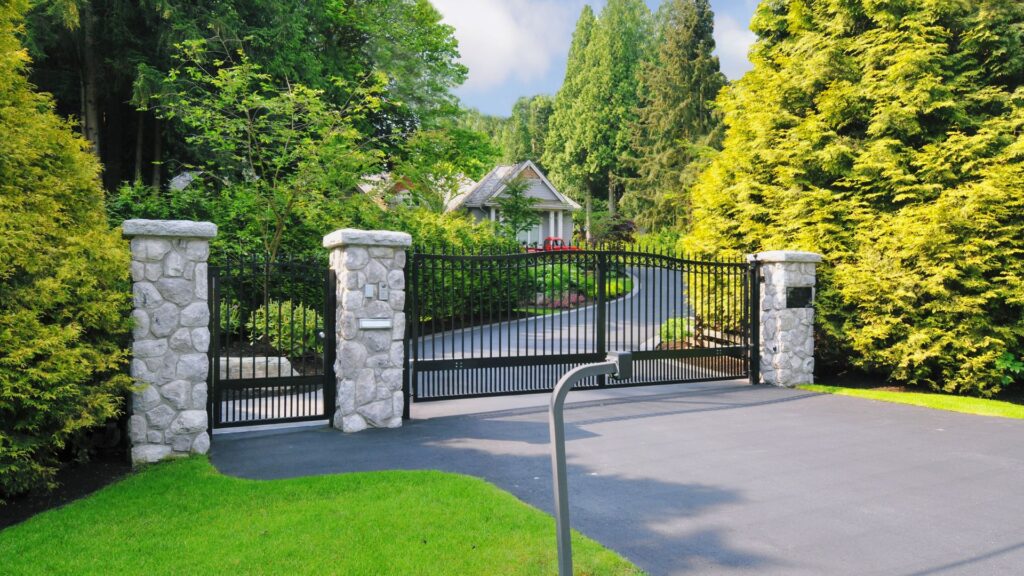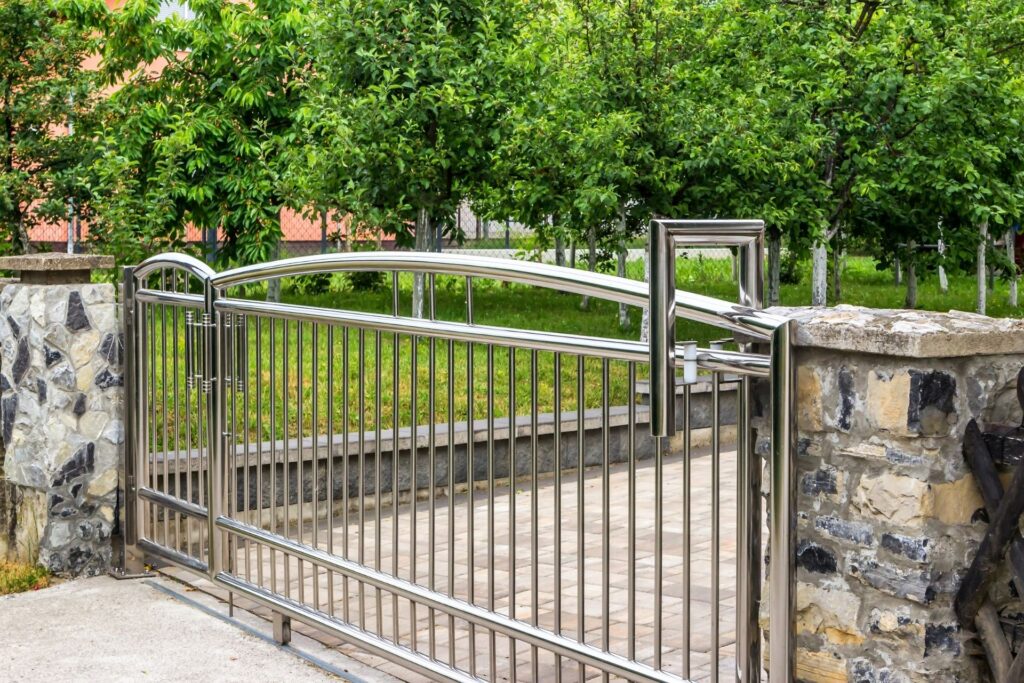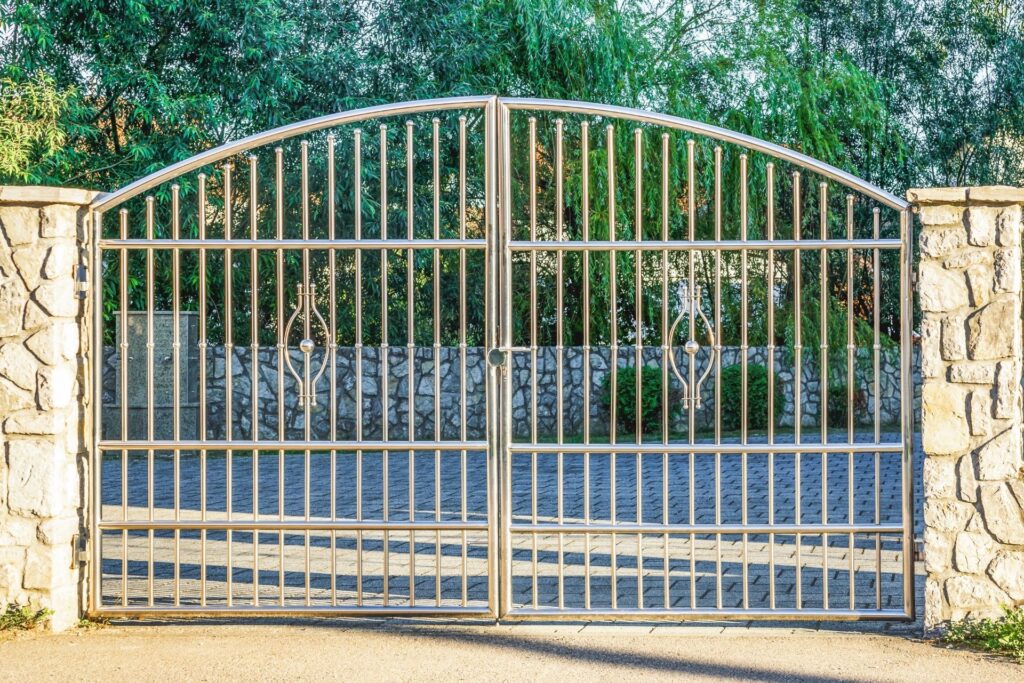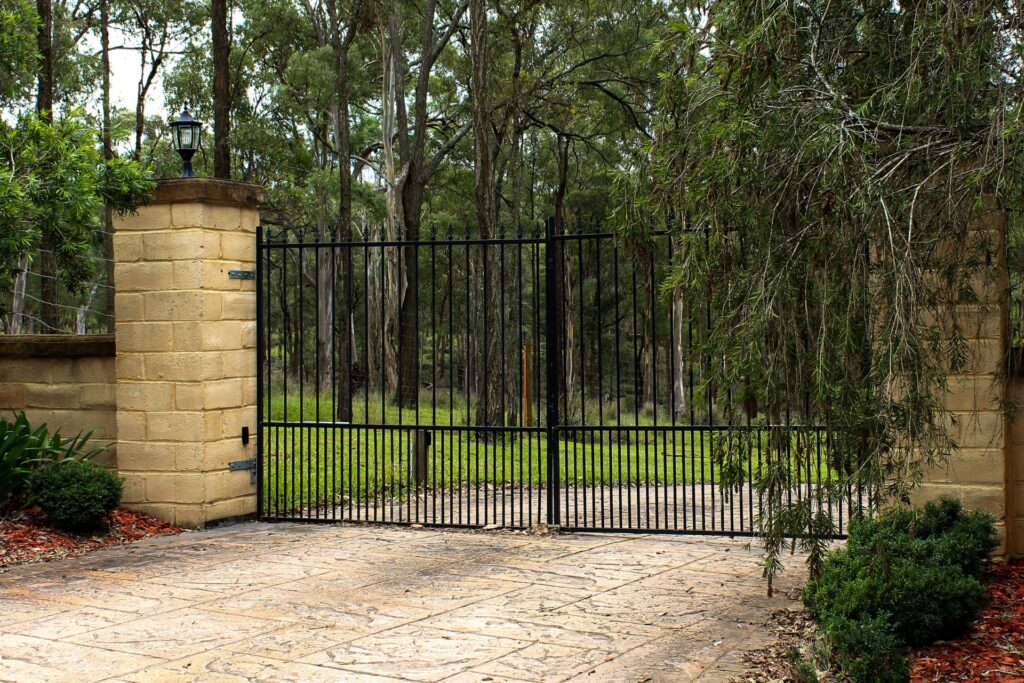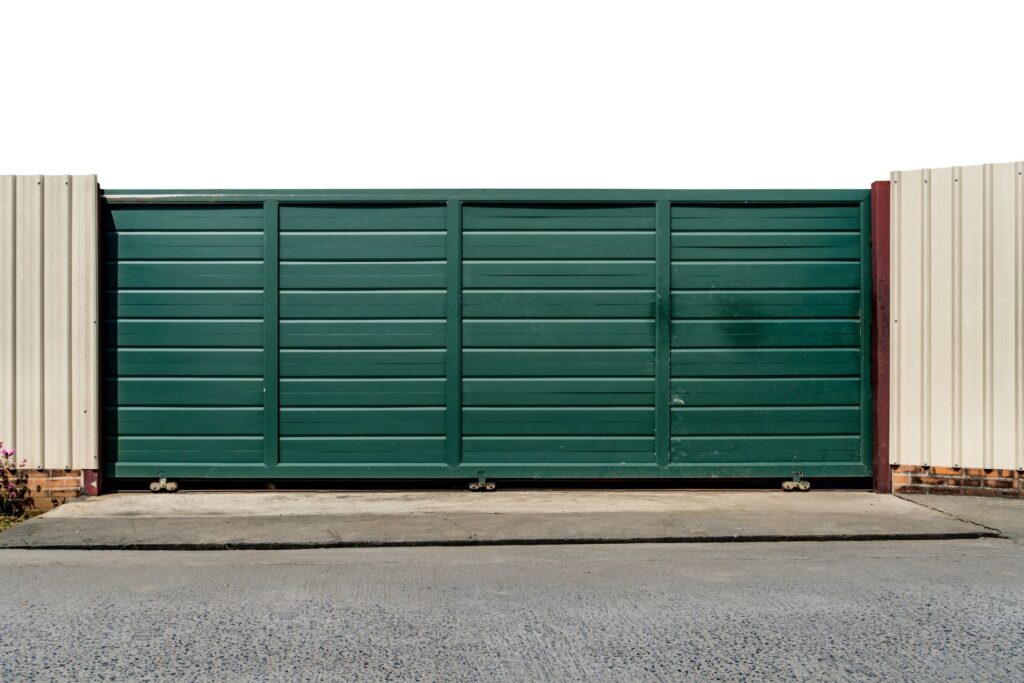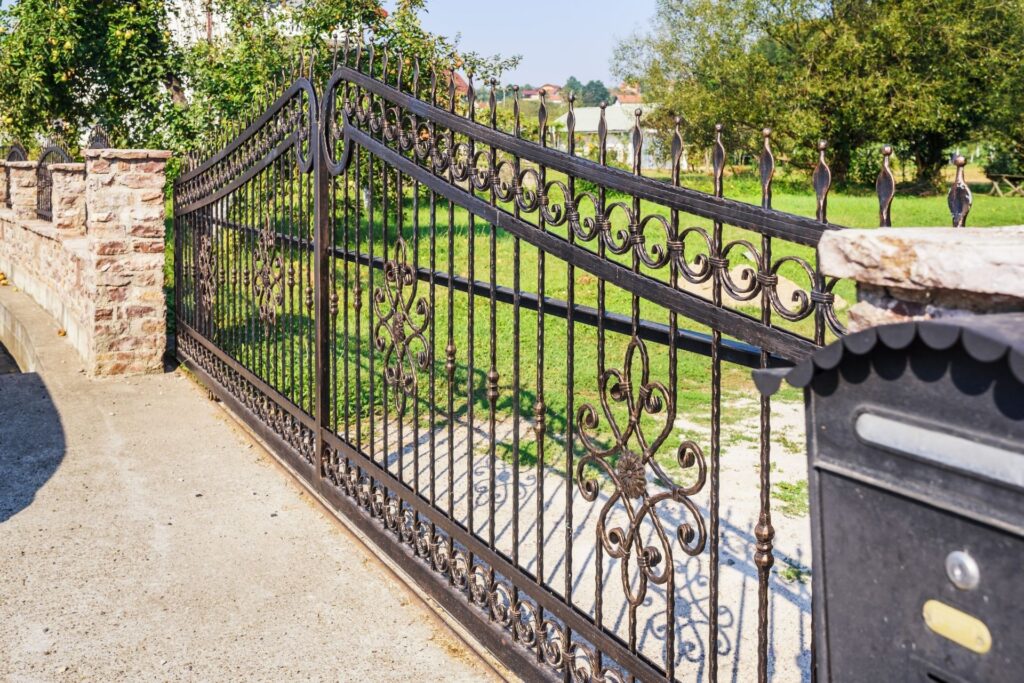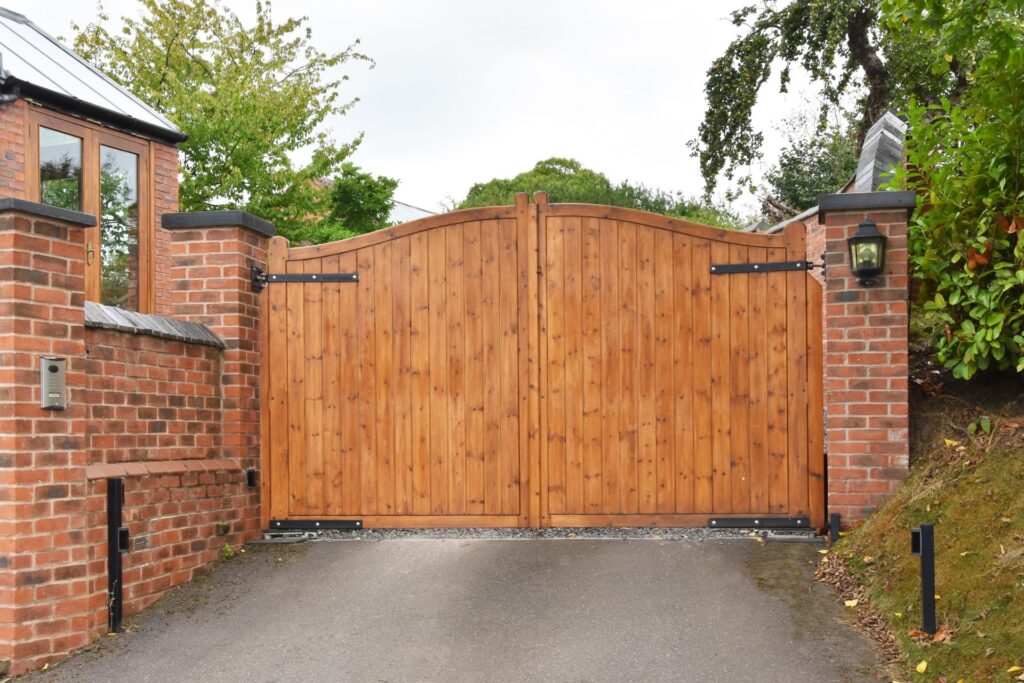Welcome to the ultimate guide to driveway gates in New Zealand! Whether you’re looking to enhance your home’s security, boost curb appeal, or add a touch of convenience, driveway gates are an excellent solution for properties of all sizes. With a range of styles, materials, and automation options available, these gates offer not only practical benefits but also a chance to make a stylish statement that complements your home or business. In this guide, we’ll walk you through everything you need to know about driveway gates in NZ, from the types and materials to costs, installation tips, and local considerations, helping you make an informed decision tailored to your needs.
The best driveway gate for your property in NZ depends on your needs and preferences. Swing gates are ideal for spacious driveways, while sliding gates are perfect for limited spaces. Choose materials like wood for a classic look or metal for durability in New Zealand’s varied weather conditions. Automated driveway gates offer added convenience and security, making them a popular choice for homeowners and businesses alike.
Table of Contents
Why Install A Driveway Gate?
A driveway gate is more than just a functional barrier; it’s an investment that enhances the security, privacy, aesthetics, and overall value of your property. Whether you’re a homeowner looking to protect your family or a business owner aiming to safeguard your premises, driveway gates offer a wide range of benefits that make them a practical and attractive addition to any property in New Zealand.
Security and Privacy
One of the primary reasons people choose to install driveway gates is to enhance the security of their property. A driveway gate acts as a physical barrier, deterring unauthorized access and potential intruders. For homeowners, this means added peace of mind, knowing that your family, pets, and belongings are protected. Similarly, for businesses, a driveway gate can help secure vehicles, equipment, and valuable assets, making it a smart choice for commercial properties.
In addition to security, driveway gates also provide privacy. They create a clear boundary between your property and the outside world, shielding your home or business from prying eyes. For families, this means you can enjoy your outdoor spaces without feeling exposed, and for businesses, it offers a professional and secure appearance to clients and customers.
Example: Imagine a family with young children living near a busy street. A driveway gate not only keeps their kids safely within the property but also prevents unwanted vehicles or solicitors from entering, creating a more secure and serene environment.
Aesthetic Appeal
Driveway gates are a perfect blend of function and style, serving as a design statement that enhances the overall look of your property. With a variety of materials, designs, and finishes available, you can choose a gate that complements your home’s architecture or adds a modern touch to your business premises. Whether it’s a classic wooden gate for a rustic look or a sleek metal design for a contemporary feel, driveway gates can significantly boost your property’s curb appeal.
In New Zealand, where properties range from urban homes to sprawling rural estates, driveway gates offer an opportunity to customize and showcase your personal style. A well-designed gate can serve as the focal point of your driveway, creating a grand entrance that leaves a lasting impression on visitors.
Convenience and Functionality
Modern driveway gates come with a variety of features that make life easier. Automated gates, for instance, allow you to open and close your gate with the push of a button, a remote control, or even a smartphone app. This is especially convenient during New Zealand’s unpredictable weather when you’d rather not step out of your vehicle to manually operate a gate.
Other functional features include intercom systems for added security and keypads for easy access. For families and businesses with frequent visitors or deliveries, these features save time and hassle, making driveway gates a practical and user-friendly option.
Example: Picture a busy homeowner who often arrives home with groceries or children in tow. An automated gate eliminates the need to exit the car and manually open the gate, providing a seamless and hassle-free experience.
Value Addition
Driveway gates not only make your property more secure and attractive but also increase its overall value. In New Zealand’s competitive housing market, a well-installed driveway gate can set your property apart and appeal to potential buyers. A secure and visually appealing entrance is a feature many buyers prioritize, especially families or those who place high importance on safety and aesthetics.
Additionally, properties with driveway gates often command higher prices because they signal added care and investment. For commercial properties, a gate can enhance your business’s professional image, attracting clients and boosting trust in your brand.
Example: Consider a couple selling their home in a suburban NZ neighborhood. Their property, with a stylish automated gate, stands out compared to others in the area, giving it a competitive edge and justifying a higher asking price.
Installing a driveway gate is a decision that combines practicality, security, and style. Whether you’re looking to safeguard your loved ones, enhance your property’s appearance, or increase its value, a driveway gate is a smart investment tailored to the unique needs of New Zealand homeowners and businesses.
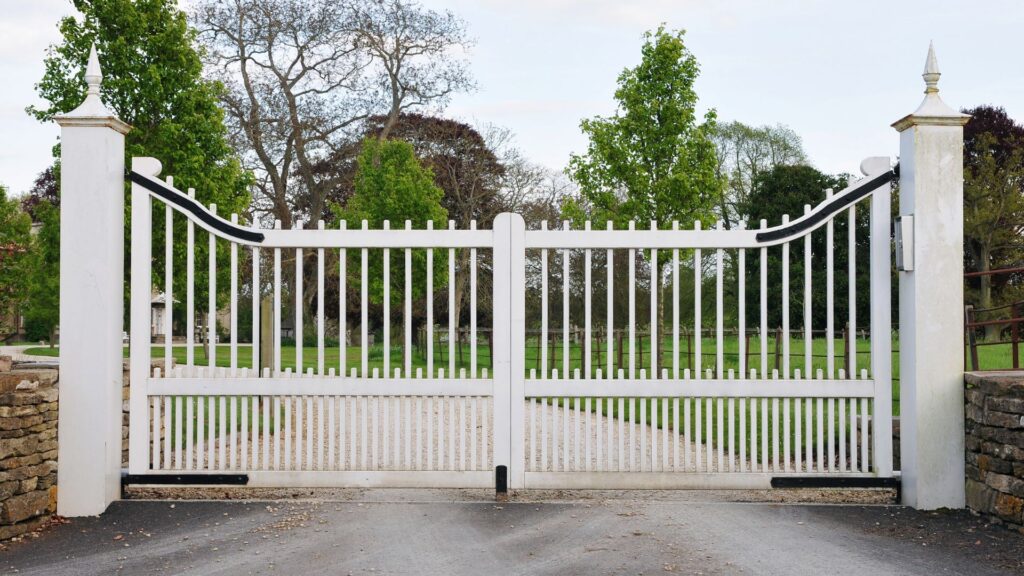
Types Of Driveway Gates
Choosing the right driveway gate for your property is an important decision that combines functionality, aesthetics, and practicality. Each type of gate has its unique features, making it suitable for different driveway layouts, property sizes, and personal preferences. Below, we’ll explore the most common types of driveway gates available in New Zealand, helping you decide which option fits your needs best.
Swing Gates: Traditional Elegance for Spacious Driveways
Swing gates are one of the most popular choices for properties with ample driveway space. These gates open inward or outward on hinges, much like a traditional door. Their classic design exudes elegance, making them a great fit for homes with a timeless or rural aesthetic.
Key Features of Swing Gates:
- Space Requirements: Swing gates need sufficient clearance to open fully, making them ideal for larger driveways or properties with open landscapes.
- Design Options: Available in a variety of materials such as wood, wrought iron, and aluminum, swing gates can be customized to match your home’s style.
- Ease of Operation: They can be manual or automated, depending on your preference and budget.
Example: A large countryside home with a gravel driveway would benefit from a double-leaf swing gate made of wrought iron, creating a grand and secure entrance.
Sliding Gates: Space-Efficient and Practical
Sliding gates are the perfect solution for properties with limited space or driveways that are close to busy streets. Instead of swinging open, these gates slide along a track parallel to your fence or wall, making them highly efficient for tight or narrow areas.
Key Features of Sliding Gates:
- Space Efficiency: Sliding gates require less operational space since they don’t swing open, making them ideal for urban properties or sloped driveways.
- Durability: These gates are often constructed from robust materials like steel or aluminum, ensuring long-term reliability.
- Smooth Operation: Automated sliding gates are particularly popular, offering easy access with remote control systems.
Example: A modern city home with a compact driveway leading directly to the street can benefit from an aluminum sliding gate, providing security without encroaching on space.
Bi-Fold Gates: Compact and Stylish for Urban Living
Bi-fold gates are a modern and innovative option, perfect for properties with minimal driveway space. These gates are divided into two or more panels that fold back on themselves, requiring less space to operate.
Key Features of Bi-Fold Gates:
- Compact Design: They open quickly and efficiently, making them ideal for driveways that are too small for traditional swing or sliding gates.
- Modern Aesthetic: Bi-fold gates often have a sleek and stylish appearance, perfect for contemporary homes.
- Automation Compatibility: These gates can be paired with automated systems for enhanced convenience.
Example: A compact driveway in a busy urban neighborhood can benefit from a bi-fold gate, allowing for quick and easy access while maximizing available space.
Automated vs. Manual Gates: A Comparative Look
One of the key decisions you’ll need to make is whether to opt for an automated or manual driveway gate. Both have their advantages, depending on your needs, budget, and lifestyle.
Automated Gates:
- Convenience: Automated gates offer seamless access with remote controls, keypads, or smartphone apps, making them a popular choice for busy homeowners.
- Enhanced Security: Automation systems often include additional features such as intercoms and cameras for added security.
- Cost: While automated gates have a higher upfront cost, their convenience and functionality are worth the investment for many property owners.
Manual Gates:
- Affordability: Manual gates are more budget-friendly and simpler to install.
- Lower Maintenance: With fewer mechanical components, manual gates require less upkeep.
- Effort: They require physical effort to open and close, which can be inconvenient during bad weather or for those with mobility challenges.
Example: A family living in a suburban home with a higher budget may opt for an automated swing gate for ease of access, while a rural property owner might prefer a simple manual gate to keep things affordable and functional.
Visualizing the Gate Types
To better understand the differences between these gates, imagine this:
- Swing Gates: Picture two large, beautifully crafted panels opening gracefully like the doors of a mansion.
- Sliding Gates: Think of a sleek gate effortlessly gliding to the side along a fence, saving space.
- Bi-Fold Gates: Envision a compact gate folding neatly in half, allowing quick access without requiring extra room to swing or slide.
If you’re considering a driveway gate for your property, visualizing how each option would fit into your layout can help you make an informed choice.
When choosing a driveway gate, it’s essential to consider your property size, layout, and style preferences. Whether you prefer the traditional charm of swing gates, the space-saving practicality of sliding gates, or the modern functionality of bi-fold gates, there’s a solution for every property. Additionally, deciding between automated and manual operation will depend on your budget and convenience needs. Investing in the right driveway gate not only enhances your property’s functionality but also adds a touch of elegance and security tailored to your lifestyle.
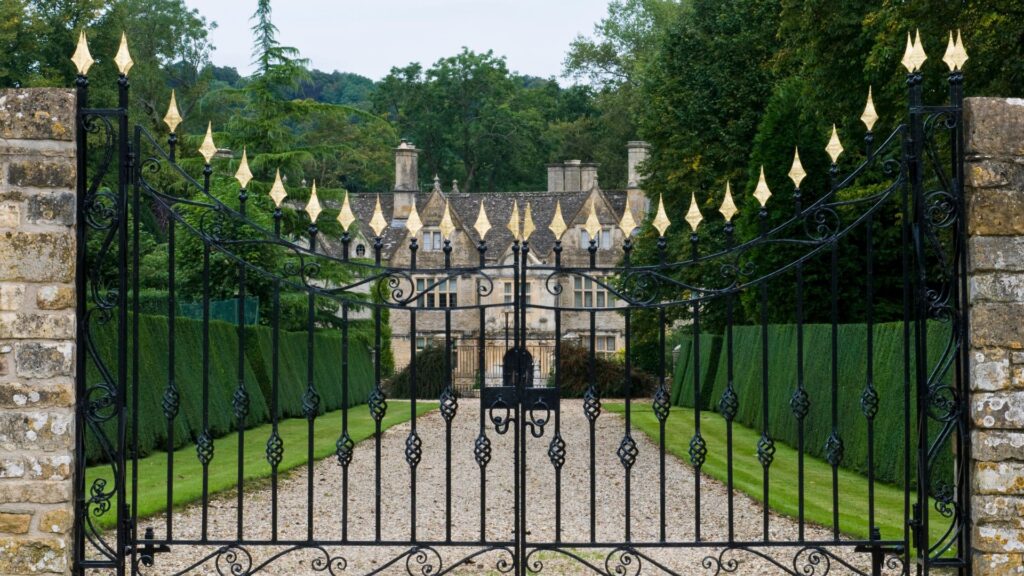
Materials Used In Driveway Gates
When choosing a driveway gate, the material is one of the most critical factors to consider. It affects not only the appearance but also the durability, maintenance, and overall performance of the gate. New Zealand’s unique climate, which includes heavy rain, high UV exposure, and coastal salt spray, makes selecting the right material even more important. Below, we’ll dive into the most popular materials for driveway gates, exploring their pros and cons to help you make the best choice for your property.
Wooden Gates: Warm and Natural Charm
Wooden gates are a timeless choice, known for their natural beauty and ability to complement rustic, traditional, or countryside properties. They add a warm, inviting touch to any entrance and can be custom-designed to fit your home’s aesthetic.
Pros:
- Aesthetic Appeal: Wooden gates have a classic, natural look that blends beautifully with greenery and traditional architecture.
- Customizable: Easily tailored with different stains, paints, or designs to suit your property’s style.
- Environmentally Friendly: Wood is a sustainable and renewable material when sourced responsibly.
Cons:
- High Maintenance: Wood is susceptible to rot, warping, and fading due to moisture and UV exposure, requiring regular staining, sealing, or painting.
- Durability: Less durable than metal or composite options, especially in regions with heavy rainfall or high humidity, common in parts of New Zealand.
- Cost: High-quality timber can be expensive, and ongoing maintenance adds to the overall cost.
Example Use Case: A rustic home in a rural area with a tree-lined driveway would benefit from a cedar or pine wooden gate, enhancing the natural surroundings while creating a charming entrance.
Metal Gates (Aluminium, Steel, Iron): Durable and Versatile
Metal gates are a popular option for their strength, durability, and modern appearance. They are highly versatile, with styles ranging from ornate wrought iron to sleek, minimalist designs, making them suitable for a wide variety of properties.
Aluminium:
- Pros: Lightweight, rust-resistant, and low-maintenance, making it ideal for coastal areas with high salt exposure.
- Cons: Less robust than steel or iron, which may not suit heavy-duty security needs.
Steel:
- Pros: Strong and durable, providing excellent security and weather resistance when galvanized. Suitable for modern or industrial aesthetics.
- Cons: Heavier than aluminium and may rust if not properly coated or maintained.
Wrought Iron:
- Pros: Elegant and timeless, wrought iron gates are often chosen for their intricate designs and traditional charm.
- Cons: Prone to rust in wet climates unless regularly painted or treated.
Example Use Case: A modern suburban home could benefit from a powder-coated aluminium gate for its clean look and minimal maintenance, while a heritage-style property might opt for a wrought iron gate for its classic elegance.
Composite Materials: Strength Meets Beauty
Composite gates are made from a combination of materials, such as wood and metal, offering the best of both worlds. They provide the natural look of wood with the added strength and durability of metal.
Pros:
- Durability: Resistant to rot, warping, and corrosion, making them ideal for New Zealand’s wet and coastal conditions.
- Low Maintenance: Requires less upkeep compared to traditional wooden gates.
- Customizable: Combines the warmth of wood with the modern appeal of metal or other synthetic materials.
Cons:
- Cost: Often more expensive upfront due to the combination of materials.
- Availability: May have fewer design options compared to pure wood or metal gates.
Example Use Case: A property in a coastal area could benefit from a composite gate that combines a wood-like finish with metal reinforcements, providing durability and aesthetic appeal.
Glass or Contemporary Designs: Sleek and Modern
Glass gates are a bold choice, perfect for contemporary homes seeking a sleek, minimalist look. Often combined with metal or composite frames, they create a striking visual impact while maintaining functionality.
Pros:
- Modern Aesthetic: Glass gates offer a clean, high-end appearance that pairs well with modern architecture.
- Customizable: Can be frosted, tinted, or clear to suit privacy and design preferences.
- Weather-Resistant: When paired with durable frames, glass gates perform well in various weather conditions.
Cons:
- Fragility: Although toughened glass is used, it’s still more prone to damage compared to other materials.
- Maintenance: Requires regular cleaning to remove smudges, dirt, and water stains.
- Cost: Glass gates are typically more expensive than traditional materials.
Example Use Case: A contemporary home with a minimalist design could benefit from a glass driveway gate with a black metal frame, creating a luxurious and sophisticated entrance.
Considering NZ’s Unique Weather Conditions
New Zealand’s climate varies significantly by region, so it’s crucial to select a material that suits your local environment:
- Coastal Areas: Aluminium or composite gates are ideal due to their resistance to salt spray and corrosion.
- Wet Regions: Avoid untreated wood or steel gates, as they are prone to rot and rust. Instead, opt for galvanized steel, aluminium, or composite materials.
- Sunny Areas: UV-resistant coatings or materials, such as powder-coated aluminium or composite, help prevent fading or warping.
Choosing the right material for your driveway gate is essential for ensuring longevity, functionality, and style. Wooden gates offer timeless beauty but require consistent upkeep, while metal gates provide unmatched durability and security. Composite materials balance strength and aesthetics, while glass gates cater to those seeking a sleek, modern design. By considering your property’s style, budget, and the local weather conditions in New Zealand, you can find the perfect material to enhance your property’s entrance and value.
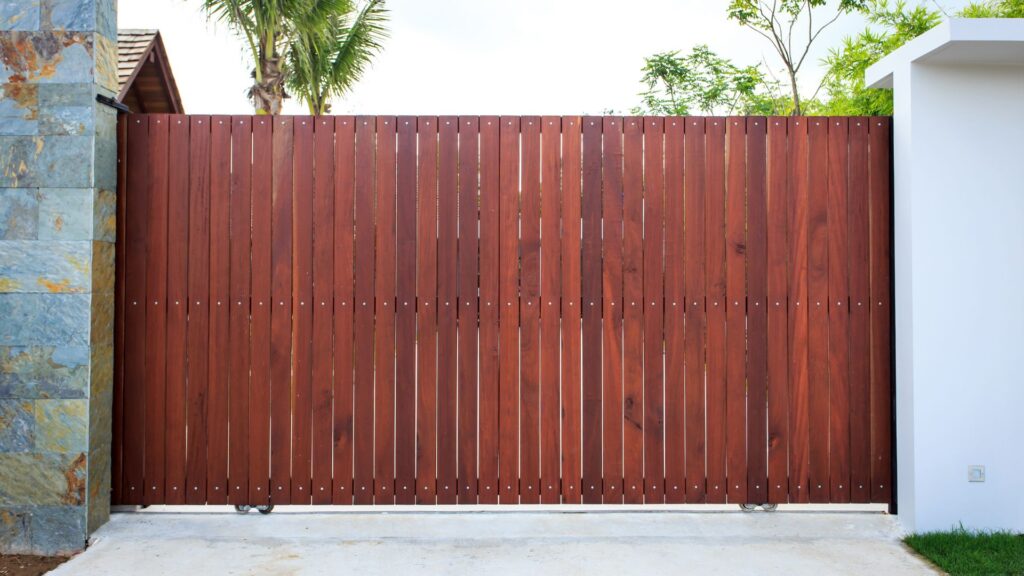
Customization And Design Options For Driveway Gates
Your driveway gate is not just a functional addition to your property; it’s also an opportunity to express your personal style and enhance your home’s overall aesthetic. With countless customization and design options available, you can create a gate that reflects your taste, complements your property, and meets your practical needs. Let’s explore the many ways you can customize your driveway gate to make it uniquely yours.
Decorative Styles: Finding the Perfect Look
Driveway gates come in a variety of decorative styles to suit different architectural themes and personal preferences. Whether your property leans toward classic elegance or modern simplicity, there’s a design to match.
- Wrought Iron Gates:
Known for their timeless appeal, wrought iron gates are perfect for traditional or heritage-style homes. Their intricate patterns and ornate details, such as scrolls and floral motifs, create an elegant entrance while offering durability and security. - Minimalist Designs:
For a sleek and modern aesthetic, minimalist gates feature clean lines and simple geometric shapes. These gates are often made from materials like aluminum or composite, making them a popular choice for contemporary homes in urban areas. - Traditional Styles:
Wooden gates with natural finishes or decorative carvings are ideal for rustic or countryside properties. They provide a warm and welcoming feel, blending seamlessly with natural landscapes. - Contemporary Designs:
Contemporary gates often combine materials like glass, steel, and composite to create bold, innovative designs. These gates are perfect for homeowners who want their property to stand out while maintaining a sophisticated look.
Example: A rural home surrounded by greenery may opt for a traditional wooden gate with a natural stain, while a modern city property might choose a minimalist aluminum gate in matte black for a polished, understated appearance.
Paint Finishes and Colors: Tailored to NZ’s Landscape
The right paint finish and color can make a world of difference in how your driveway gate blends with or enhances its surroundings. In New Zealand, where homes are often inspired by the natural environment, choosing colors that align with the local landscape is a smart way to elevate your property’s appeal.
- Earthy Tones:
Greens, browns, and greys are excellent choices for rural or suburban homes, helping your gate harmonize with nature. - Bold Colors:
For urban properties, bold hues like black, navy blue, or deep red can make your gate a standout feature. - Neutral Shades:
Neutral tones such as white, beige, or charcoal are versatile and timeless, working well with almost any architectural style.
Finishes to Consider:
- Matte Finish: Offers a modern and subdued look, ideal for contemporary gates.
- Glossy Finish: Adds a touch of luxury and makes the gate more eye-catching.
- Powder Coating: A durable option that protects against rust and fading, perfect for NZ’s varying weather conditions.
Example: A home in coastal New Zealand might choose a powder-coated aluminum gate in a soft grey to complement the ocean views, while a suburban villa could feature a rich chocolate-brown wooden gate for warmth and character.
Personalizing with Features: Beyond the Basics
Adding features to your driveway gate can greatly enhance its functionality, convenience, and overall aesthetic. These customizations not only make your gate more practical but also elevate its appeal as a personalized element of your property.
- Intercom Systems:
Intercoms provide a secure way to communicate with visitors before granting access. This is especially useful for gated properties with long driveways or busy households. Modern systems often include video intercoms, allowing you to see who’s at the gate, even remotely. - Lighting:
Integrating lighting into your driveway gate design not only boosts safety and visibility at night but also creates a welcoming atmosphere. Consider options like solar-powered lights, LED strips, or decorative lanterns mounted on gateposts. - Security Cameras:
For enhanced security, adding cameras to your gate system allows you to monitor activity and protect your property. Paired with an automated gate, these cameras provide peace of mind for both residential and commercial properties. - Smart Automation:
Features like keypad entry, remote controls, or smartphone-operated systems make accessing your property more convenient. Advanced options even allow integration with home automation systems for a seamless experience.
Example: A family home in an urban area could benefit from a gate with a video intercom and motion-activated lighting for added security, while a rural property might prioritize solar-powered lights and a simple keypad system for convenience.
Customizing your driveway gate is about more than just functionality—it’s a way to express your style and create an entrance that truly enhances your property. Whether you prefer the intricate details of wrought iron, the clean lines of minimalist designs, or the warmth of traditional wooden gates, the options are nearly endless. Pairing your chosen style with the right paint finish, color, and additional features like intercoms or lighting can take your gate to the next level, ensuring it’s not only practical but also a stunning feature of your home. By tailoring your driveway gate to your property’s unique needs and aesthetic, you’ll create a lasting impression for years to come.
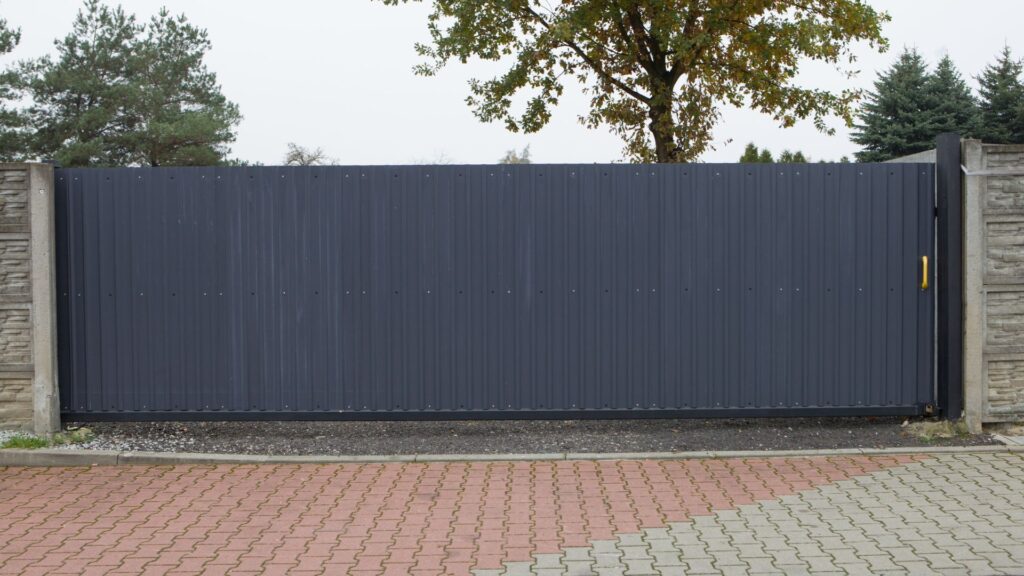
Cost Of Driveway Gates In NZ
The cost of a driveway gate in New Zealand varies widely depending on factors such as material, size, design complexity, automation features, and installation requirements. Whether you’re looking for a simple manual gate or a high-tech automated system, understanding the breakdown of costs will help you make an informed decision that fits your budget and needs. Below, we’ll dive into the key cost factors and provide a general price range to guide your planning.
Material Costs
The material you choose for your driveway gate has a significant impact on the overall cost. Different materials offer varying levels of durability, aesthetic appeal, and maintenance requirements, which are reflected in their price.
- Wooden Gates:
Wooden gates are known for their natural charm and timeless look, but they tend to be more expensive due to the quality of wood required for outdoor durability. Materials like cedar or hardwood are more costly but last longer, while softer woods may be more affordable but require more maintenance.- Approximate Cost: $2,500–$7,000
- Metal Gates (Aluminium, Steel, or Wrought Iron):
Metal gates are highly durable and versatile. Aluminium is lightweight and rust-resistant, making it ideal for coastal properties, while steel and wrought iron offer greater strength and security but require protective coatings to prevent rust.- Approximate Cost: $3,000–$10,000
- Composite Materials:
Composite gates combine the aesthetics of wood with the durability of metal, offering the best of both worlds. These gates are low-maintenance and weather-resistant but are typically priced higher due to their advanced manufacturing process.- Approximate Cost: $4,000–$12,000
- Glass or Contemporary Gates:
Sleek glass gates paired with metal or composite frames are a premium option for modern homes. These gates are stylish but come at a higher cost due to the use of tempered glass and advanced designs.- Approximate Cost: $6,000–$15,000+
Gate Size and Complexity
The size of your driveway gate and the complexity of its design are other major factors influencing cost.
- Size:
Larger gates require more materials and labor to construct, increasing the overall price. Double gates for wide driveways or taller gates for added security will naturally cost more. - Design Complexity:
Custom or intricate designs, such as ornate wrought iron patterns or detailed carvings on wooden gates, require more time and craftsmanship, adding to the expense. Minimalist or standard designs are generally more affordable.
Example: A simple single-leaf wooden gate for a narrow driveway will cost less than a double sliding gate with custom laser-cut designs.
Automation Costs
Automated gates are becoming increasingly popular in New Zealand due to their convenience and enhanced security. However, the addition of automation systems increases the overall cost.
- Automation Systems:
The price of automation depends on the technology used, such as motorized systems, remote controls, or smart integrations with apps and intercoms. Sliding gates typically require heavier-duty motors compared to swing gates.- Approximate Cost: $2,000–$6,000 for automation systems
- Smart Features:
Features like keypads, video intercoms, and smartphone connectivity can add $500–$3,000 to the total cost.
Example: A fully automated aluminum sliding gate with remote controls and an integrated video intercom system could cost upwards of $10,000, depending on the size and features.
Installation Costs in NZ
Installation costs vary depending on the complexity of the project and the property’s location. Professional installation ensures that your gate operates smoothly and complies with safety regulations.
- Terrain and Site Preparation:
Uneven ground, sloping driveways, or difficult-to-access areas can increase installation costs. Preparing the site, such as leveling the ground or laying a concrete foundation, adds to the expense. - Labor Charges:
Professional installers in New Zealand typically charge $1,000–$4,000 for driveway gate installation, depending on the gate type and features. Automated gates may incur higher installation fees due to the wiring and electrical setup required. - Regional Differences:
Costs may vary based on location. For instance, installation in rural or remote areas may involve additional travel or delivery charges.
Overall Cost Range
The total cost of a driveway gate in NZ can range from $3,000 to $15,000+, depending on the factors mentioned above. Here’s a general breakdown:
- Manual Wooden Gate (Basic Design): $3,000–$6,000
- Automated Metal Gate (Standard Design): $6,000–$10,000
- Custom Glass or Contemporary Gate with Smart Features: $12,000–$20,000+
When budgeting for a driveway gate, remember to account for ongoing maintenance costs, especially for wooden or metal gates that require regular care to withstand New Zealand’s weather conditions. Always obtain multiple quotes from reputable suppliers and installers to ensure you get the best value for your investment. While the upfront cost may seem significant, a high-quality driveway gate enhances your property’s security, functionality, and curb appeal, making it a worthwhile addition to any home or business.
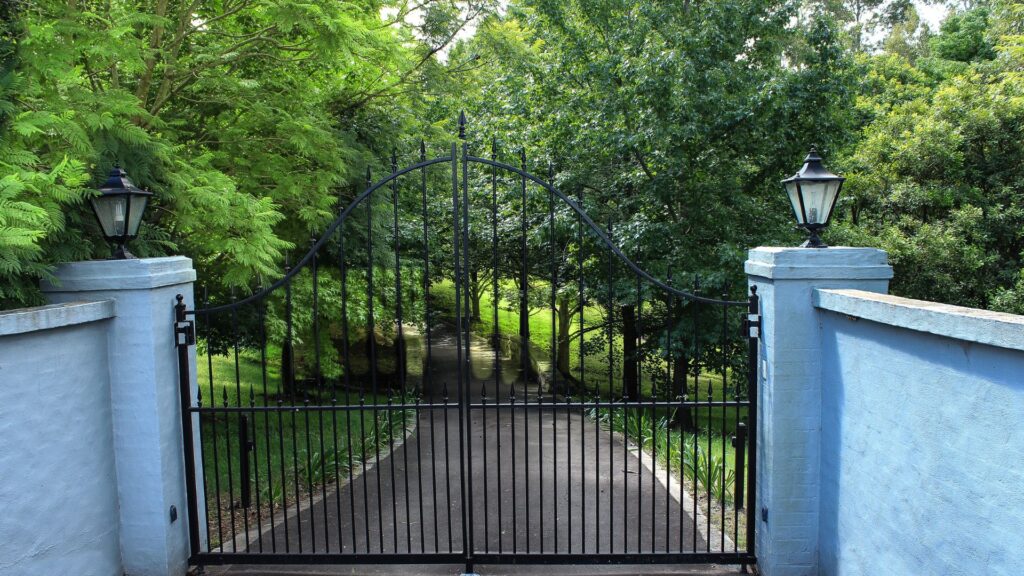
Installation And Maintenance Tips For Driveway Gates
Installing and maintaining a driveway gate is essential to ensure it operates smoothly, remains durable, and continues to add value to your property. Whether you’re deciding between professional or DIY installation or looking for effective maintenance strategies, this guide will help you make informed decisions tailored to New Zealand’s unique conditions.
Professional vs. DIY Installation: Which Is Better for NZ Homeowners?
Choosing between professional installation and a DIY approach depends on your skill level, the complexity of the gate, and your budget. Here’s a breakdown to help you decide:
- Professional Installation:
Opting for professional installation ensures that your gate is correctly installed and complies with safety regulations. This is especially crucial for automated gates, which require precise electrical wiring and programming. Professionals can also handle challenges such as sloped driveways, uneven terrain, or complex gate designs.- Benefits:
- Expertise ensures the gate is level, secure, and fully operational.
- Avoids potential issues such as misaligned gates or faulty automation systems.
- Saves time and effort, especially for larger or automated gates.
- Cost: Installation costs in NZ typically range from $1,000 to $4,000, depending on the gate type and site conditions.
- Benefits:
- DIY Installation:
DIY installation may be suitable for smaller, manual gates if you have the necessary tools and skills. However, it’s important to follow manufacturer guidelines and check local regulations, particularly if your property has zoning restrictions or safety requirements.- Benefits:
- Cost-effective for basic gates.
- Provides a sense of accomplishment for those who enjoy hands-on projects.
- Challenges:
- Risk of improper installation, leading to operational issues.
- Time-intensive, especially for those unfamiliar with gate systems.
- Benefits:
Recommendation: While DIY installation can work for basic manual gates, professional installation is highly recommended for automated gates or complex setups. In New Zealand, where weather conditions and terrain vary, a professional’s expertise can save you costly repairs and ensure long-term functionality.
Importance of Site Preparation
Proper site preparation is a critical step in ensuring your driveway gate functions efficiently and lasts for years. Skipping this stage can lead to operational issues, uneven gates, or even damage over time.
- Ground Leveling:
A level surface is essential for the smooth operation of swing or sliding gates. Uneven terrain can cause gates to sag, misalign, or drag on the ground, which can compromise their functionality and durability. Professionals often use concrete or gravel bases to create a stable foundation. - Electrical Wiring for Automated Gates:
For automated gates, careful planning of electrical wiring is crucial. This includes laying underground cables, ensuring weatherproof connections, and setting up power sources. Proper wiring not only ensures the gate operates efficiently but also prevents safety hazards such as short circuits or system failures.
Tip: If your property is on a slope or has challenging terrain, consult a professional installer to address these issues during site preparation.
Maintenance Tips for Driveway Gates
Regular maintenance is essential to keep your driveway gate in optimal condition, especially in New Zealand’s diverse weather conditions. Whether your gate is made of wood, metal, or composite, these maintenance practices will help you avoid costly repairs and extend its lifespan.
- Regular Cleaning:
- For wooden gates, clean dirt, debris, and mold regularly to prevent rot and discoloration. Use a mild detergent and avoid abrasive cleaners that can damage the wood. Applying a sealant or wood preservative annually protects against moisture and UV damage.
- For metal gates, clean with water and a non-corrosive detergent to remove grime and prevent rust. Inspect for signs of rust or peeling paint and touch up damaged areas with rust-proof paint or a protective coating.
- Lubricating Hinges and Moving Parts:
Swing and sliding gates rely on hinges, rollers, and tracks for smooth operation. Lubricate these components with a silicone-based lubricant or grease every six months to prevent squeaking, stiffness, or wear. For automated gates, ensure the motor and gears are clean and well-lubricated. - Checking Automation Systems:
Automated gates require periodic checks to ensure their motor, sensors, and control systems are functioning correctly. Look out for:- Unusual noises or delays in operation.
- Faulty remote controls or keypads.
- Obstructions in the gate’s path that might interfere with sensors.
Regularly test the automation system and consult a professional if you notice any issues.
Why Regular Maintenance Is Important in NZ
New Zealand’s climate can be tough on driveway gates due to high UV exposure, coastal salt spray, and heavy rainfall in some areas. Proper maintenance helps your gate withstand these conditions, ensuring it remains functional and visually appealing for years to come.
- In coastal areas, prioritize rust prevention for metal gates and sealing for wooden gates to combat salt spray.
- In wet regions, check for water pooling around the base of the gate and ensure drainage systems are in place to prevent rot or corrosion.
- In sunny regions, protect your gate from UV damage by using weather-resistant finishes or coatings.
Installing and maintaining a driveway gate requires careful planning and ongoing care, but the effort is well worth it. Professional installation ensures your gate is safe, level, and functional, while proper site preparation addresses potential challenges such as uneven terrain or electrical needs. Regular maintenance, such as cleaning, lubrication, and system checks, keeps your gate looking great and working smoothly, even in New Zealand’s challenging weather conditions. By investing in quality installation and consistent upkeep, you’ll enjoy the security, convenience, and aesthetic appeal of your driveway gate for years to come.
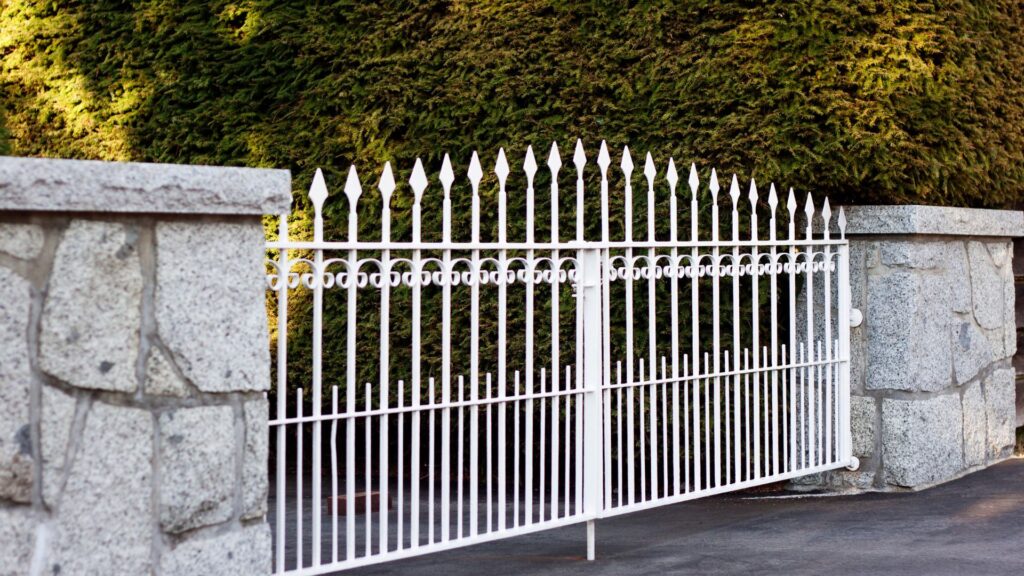
Legal Considerations And NZ-Specific Regulations For Driveway Gates
Installing a driveway gate in New Zealand requires more than just choosing the right design and material. Homeowners and businesses must also navigate legal considerations and regulations to ensure their gate complies with local laws and safety standards. Ignoring these rules can lead to costly penalties, removal orders, or safety risks. Below, we’ll explore key zoning requirements, safety standards, and special considerations for heritage or unique properties.
Zoning and Property Boundary Rules in NZ
Zoning and property boundary regulations vary across different regions in New Zealand, but they are an essential consideration when installing a driveway gate. These rules govern aspects such as gate height, placement, and whether council approval is required.
- Gate Height Limits:
- Most councils in NZ restrict the height of gates and fences at the front boundary to maintain visibility and prevent obstructions to traffic or pedestrians. For example, many councils set a maximum height limit of 1.8 meters for gates facing the road, but this may vary by region.
- Gates exceeding the height limit often require resource consent or council approval.
- Boundary Placement:
- Driveway gates must be installed within your property boundary and not encroach onto public footpaths or neighboring properties. Ensure accurate boundary measurements before installation to avoid disputes.
- For shared driveways, discuss gate placement with your neighbors and check for easements or shared property agreements that may affect your plans.
- Council Approvals:
- In some cases, council approval may be required for gates that are part of a fence, wall, or structure visible from the street. This is particularly true for taller or automated gates, as they may impact traffic visibility or safety.
Tip: Check with your local council before proceeding with your gate installation. Most councils provide zoning maps and guidelines on their websites to help you understand the requirements specific to your property.
Safety Standards for Automated Gates
Automated gates offer convenience and security, but they must comply with strict safety standards to protect users, particularly children and pets. Neglecting these standards can lead to accidents or liability issues.
- Force Limitation:
Automated gates should be equipped with force limitation mechanisms to prevent injury. This means the gate should stop or reverse if it encounters an obstacle, such as a person, pet, or vehicle. - Sensors and Safety Beams:
Safety sensors or infrared beams are critical for detecting movement in the gate’s path. These devices prevent the gate from closing if something is detected, reducing the risk of accidents. - Manual Override Options:
Automated gates must have a manual override function in case of power outages or emergencies, allowing safe operation without electricity. - Child Safety Features:
To ensure child safety, gates should be designed with no sharp edges, pinch points, or gaps that could trap small fingers. Additionally, control panels or remotes should be placed out of children’s reach. - Compliance with Standards:
Automated gates in New Zealand should comply with the relevant safety standards, such as AS/NZS 60335.2.103, which outlines safety requirements for gate operators.
Tip: Always choose a reputable supplier and installer who understands and adheres to these safety standards. Regularly inspect and maintain your gate’s automation system to ensure it remains safe and functional.
Unique Local Regulations for Heritage Properties or Specific Neighborhoods
If your property is located in a heritage area or a neighborhood with unique regulations, additional considerations may apply. These rules are designed to preserve the character and aesthetics of the area while ensuring safety and functionality.
- Heritage Properties:
- For properties with heritage status, you may need to follow specific design guidelines to ensure your gate complements the historical features of the property.
- Certain materials, colors, or styles may be restricted to maintain the area’s visual consistency. For example, wrought iron or timber gates might be required in heritage zones, while modern glass or composite designs may not be allowed.
- Gated Communities or Neighborhoods:
- Some gated communities or subdivisions have their own rules regarding gate designs, colors, or automation features. These covenants are often outlined in the property agreement and must be followed to avoid disputes.
Tip: Consult with your local council or body corporate to understand the regulations specific to your area. For heritage properties, contacting a heritage advisor or architect may be beneficial.
Useful Resources for NZ Homeowners
To ensure your driveway gate complies with local regulations, refer to the following resources and contacts:
- Local Council Websites:
- Auckland Council
- Wellington City Council
- Christchurch City Council
These websites provide zoning maps, resource consent requirements, and design guidelines.
- Building Performance (NZ Government):
- Visit the Building Performance website for information on building and construction standards in New Zealand.
- Heritage New Zealand:
- If your property has heritage status, visit Heritage New Zealand Pouhere Taonga for guidance on maintaining compliance with heritage regulations.
- Worksafe NZ:
- For safety standards related to automated gates, consult Worksafe NZ for advice on compliance and best practices.
Installing a driveway gate in New Zealand requires careful attention to zoning laws, safety standards, and any unique local regulations. Ensuring your gate complies with these rules not only avoids legal complications but also guarantees the safety and functionality of your installation. Whether you’re dealing with height restrictions, automation safety features, or heritage property requirements, taking the time to understand and adhere to these considerations will help you create a secure and stylish entrance that adds lasting value to your property. Always consult local council resources or professionals to navigate these regulations with confidence.
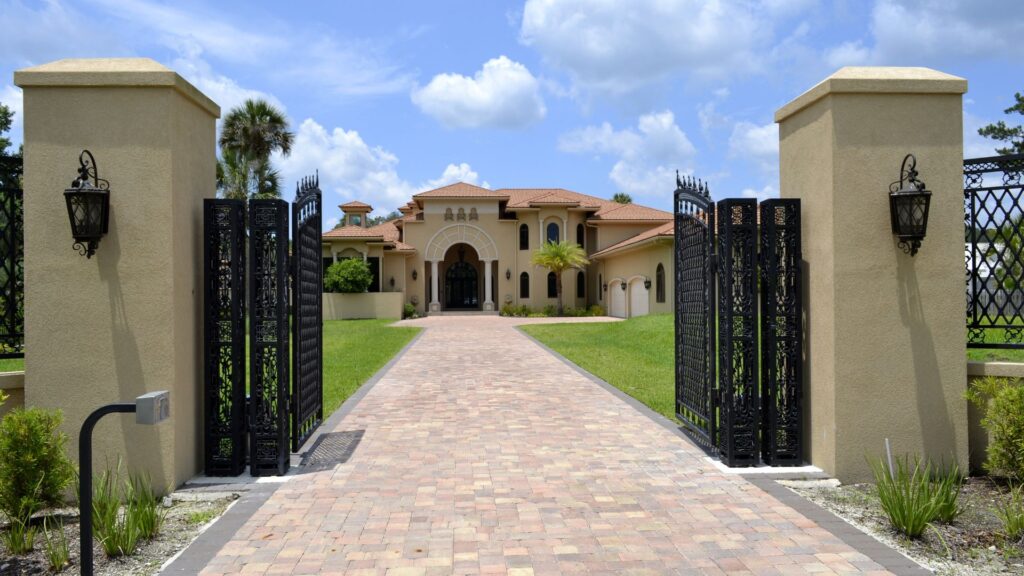
Popular Driveway Gate Suppliers In NZ
Choosing the right supplier for your driveway gate is a crucial step in ensuring you receive a high-quality product that meets your needs. Fortunately, New Zealand is home to several reputable businesses specializing in custom gates, automated systems, and innovative solutions tailored to both residential and commercial properties. Here, we’ll explore some of the leading suppliers, offer tips for selecting the right provider, and highlight eco-friendly or cutting-edge options to consider.
Reputable Local Businesses Specializing in Driveway Gates
New Zealand boasts a range of trusted suppliers and manufacturers who provide custom-made gates, automation services, and complete installation packages. Here are some notable companies:
- Wrought Iron Specialists NZ
Renowned for their handcrafted wrought iron gates, this company focuses on traditional and modern designs that are both durable and elegant. Their gates are highly customizable, making them ideal for properties with unique aesthetic or security requirements. - Gatemaster Automation
Based in Auckland, Gatemaster Automation offers a wide selection of automated driveway gates, including swing and sliding options. They also provide advanced features like remote controls, smart integrations, and intercom systems for added convenience. - Kiwi Gate Solutions
A Christchurch-based company, Kiwi Gate Solutions specializes in durable aluminum and steel gates designed to withstand New Zealand’s diverse weather conditions. Their gates are available in various styles, from minimalist to decorative, and they offer full installation services. - Eco Gates NZ
This innovative supplier focuses on sustainable materials and energy-efficient gate solutions. They offer solar-powered automated gates, which are a perfect option for eco-conscious homeowners or properties in remote areas. - The Gate Company
Operating nationwide, The Gate Company provides a wide range of options, including timber, steel, and composite gates. They’re known for their excellent customer service, offering both design consultations and maintenance plans to keep gates in top condition.
Tips for Choosing the Right Supplier
Selecting the best supplier for your driveway gate involves more than just comparing prices. Here are some tips to help you make an informed decision:
- Check Reviews and Testimonials:
Look for customer feedback on the company’s website, Google, or social media platforms. Positive reviews and testimonials indicate a track record of reliability, quality, and excellent service. - Evaluate Experience and Expertise:
Choose a supplier with extensive experience in manufacturing and installing driveway gates. An experienced company is more likely to handle complex requirements, such as sloping driveways or custom designs, with ease. - Ask About Warranties:
A reputable supplier should offer warranties on both the gate and its automation components. This protects your investment and provides peace of mind should any issues arise. - Inspect Their Portfolio:
Request to see examples of previous work to ensure their design and craftsmanship meet your standards. Many suppliers showcase their projects online, allowing you to assess their range and quality. - Compare Quotes and Services:
Obtain multiple quotes to compare pricing and inclusions. Some companies may offer additional services, such as maintenance plans or post-installation support, which add value to their offering. - Assess Customer Support:
A supplier with excellent customer support will be responsive, professional, and willing to answer your questions throughout the process. This is particularly important for automated gates, which may require troubleshooting or servicing over time.
Innovative and Eco-Friendly Options in NZ
As sustainability becomes increasingly important, many NZ suppliers are incorporating eco-friendly and innovative solutions into their driveway gate offerings. These options are perfect for homeowners or businesses looking to reduce their environmental footprint without compromising functionality or style.
- Solar-Powered Gates:
Solar-powered automated gates are a sustainable choice, harnessing energy from the sun to operate. These gates are especially useful for properties in rural or remote areas where access to mains electricity may be limited. Companies like Eco Gates NZ specialize in these systems, ensuring they’re both efficient and durable in New Zealand’s climate. - Recycled Materials:
Some suppliers offer gates made from recycled materials, such as repurposed wood or metal, which not only reduce waste but also add a unique, rustic charm to your property. - Low-Maintenance Coatings:
Innovative powder coatings and UV-resistant finishes minimize the need for chemical treatments, making gates more environmentally friendly while reducing maintenance efforts. - Smart Gate Systems:
Suppliers like Gatemaster Automation provide gates integrated with smart home technology, allowing you to control access remotely via smartphone apps. These systems are not only convenient but also reduce energy consumption by optimizing gate operations.
Example: A solar-powered sliding gate with a smart intercom system could be an ideal choice for a modern, eco-conscious family in a suburban NZ neighborhood, combining sustainability with cutting-edge technology.
When choosing a driveway gate supplier in New Zealand, it’s essential to prioritize quality, reliability, and customer service. Reputable businesses such as Wrought Iron Specialists NZ, Gatemaster Automation, and Eco Gates NZ offer a range of options to suit various needs, from traditional designs to innovative, eco-friendly solutions. By researching reviews, comparing quotes, and assessing their portfolios, you’ll be able to select a supplier that aligns with your budget, style, and functionality requirements.
Whether you’re looking for a handcrafted wrought iron gate, a solar-powered automated system, or a low-maintenance composite design, New Zealand’s top suppliers have something for every property. Investing in the right supplier ensures your driveway gate not only enhances your home’s security and curb appeal but also stands the test of time.
Looking for a secure, stylish, and functional driveway gate in New Zealand? Visit Fence and Gate Auckland to explore our range of high-quality driveway gates, compare options, and get expert advice on choosing the best gate for your home or business.
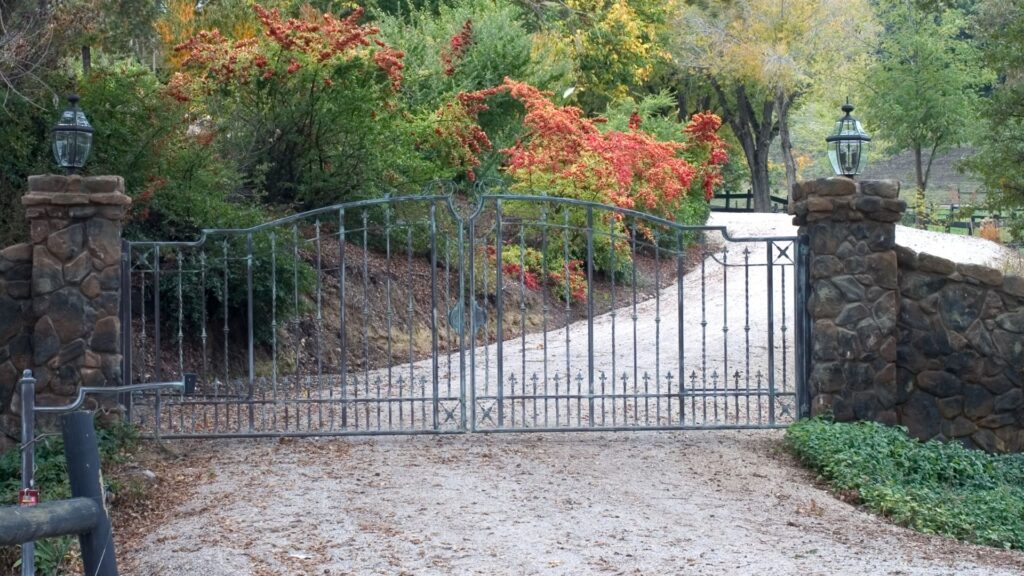
FAQs: About Driveway Gate NZ
What are the main benefits of installing a driveway gate?
Driveway gates provide enhanced security, privacy, and convenience for your property. They can also boost curb appeal and increase property value, making them a worthwhile investment for both residential and commercial properties.
What types of driveway gates are available in New Zealand?
The most common types of driveway gates include swing gates, sliding gates, bi-fold gates, and automated gates. Each type is suited to different property layouts and preferences, offering various benefits in terms of space efficiency and functionality.
Which material is best for driveway gates in NZ?
The best material depends on your preferences and the local climate. Wooden gates provide a classic look but require regular maintenance, while metal gates (such as steel or aluminum) are durable and low-maintenance. Composite materials and glass options are also gaining popularity for modern homes.
How much does a driveway gate cost in New Zealand?
The cost of a driveway gate in NZ can range from $3,000 to $15,000 or more, depending on the size, material, design, and whether it includes automation. Installation costs and site preparation can also affect the total price.
Are automated driveway gates worth the investment?
Yes, automated gates are a convenient and secure option. They allow easy access with remote controls or keypads, making them ideal for busy households or businesses. While they cost more upfront, the added convenience and security are often worth the investment.
Can I install a driveway gate myself?
DIY installation is possible for simpler manual gates, but professional installation is recommended for automated or complex designs. A professional installer ensures proper alignment, safety compliance, and durability, especially given NZ’s varying terrains.
How do I maintain my driveway gate?
Regular maintenance includes cleaning to prevent rust or weather damage, lubricating hinges and moving parts, and checking the automation system (if applicable). Wooden gates may need periodic sealing or painting to protect them from moisture.
What are the zoning or legal requirements for driveway gates in NZ?
NZ has specific regulations for driveway gates, such as height restrictions and boundary requirements. Some councils may require permits for gates over a certain height, so it’s important to check local regulations before installation.
How do I choose the right driveway gate for my property?
Consider factors like the size and layout of your driveway, the material’s durability and aesthetic appeal, your budget, and whether you prefer manual or automated operation. Consulting with a local expert can help you make the best choice.
Where can I buy driveway gates in New Zealand?
Reputable suppliers across NZ offer a wide range of driveway gates, including custom designs. Look for companies with good customer reviews, warranties, and options for professional installation. Many suppliers also provide eco-friendly or innovative designs to suit modern needs.
Conclusion
Driveway gates are a valuable addition to any property, offering enhanced security, privacy, and peace of mind while boosting curb appeal with their aesthetic charm. They provide convenience, especially with automated options, making daily access seamless and efficient. Whether you prefer the timeless elegance of wrought iron, the natural warmth of wood, or the sleek modernity of composite or glass designs, driveway gates can be customized to suit your property’s style and needs. By investing in a high-quality gate, you not only elevate your property’s functionality but also increase its overall value. Thinking about installing a driveway gate? Explore New Zealand’s trusted suppliers today, consult local professionals, and find the perfect match to transform your property into a secure and stylish haven!
About the Author:
Mike Veail is a recognized digital marketing expert with over 6 years of experience in helping tradespeople and small businesses thrive online. A former quantity surveyor, Mike combines deep industry knowledge with hands-on expertise in SEO and Google Ads. His marketing strategies are tailored to the specific needs of the trades sector, helping businesses increase visibility and generate more leads through proven, ethical methods.
Mike has successfully partnered with numerous companies, establishing a track record of delivering measurable results. His work has been featured across various platforms that showcase his expertise in lead generation and online marketing for the trades sector.
Learn more about Mike's experience and services at https://theleadguy.online or follow him on social media:

